Did you know Ethereum is the second-largest cryptocurrency and considered the most secure? This is because of its advanced blockchain technology and proof-of-stake consensus method. In today’s digital world, keeping your cryptocurrency safe is key. Cybercriminals are always looking to steal valuable assets.
This article will show you how to keep your crypto transactions safe. You’ll learn about protecting your digital assets from threats like phishing scams and Ponzi schemes. Whether you’re new to cryptocurrency or have experience, these tips will help you secure your financial future.
Key Takeaways
- Ethereum is the most secure cryptocurrency due to its blockchain technology and proof-of-stake consensus method.
- Cryptocurrency transactions rely on cryptography, with techniques like hashing and private key signing for authentication.
- Protecting private keys, using strong passwords, and implementing two-factor authentication are essential security strategies.
- Regularly monitoring your crypto accounts and staying informed about the latest security trends can help you identify and mitigate threats.
- Utilizing hardware wallets, virtual private networks (VPNs), and encryption tools can further enhance the security of your cryptocurrency transactions.
Understanding the Importance of Secure Crypto Transactions
In the fast-changing world of cryptocurrency, keeping your assets safe is key. Transactions are permanent, so protecting your digital money is a must. Blockchain’s decentralized nature offers some security, but users must act to keep their transactions and money safe.
Why Security is Crucial in Cryptocurrency
The world of cryptocurrency has seen many security breaches and hacks. For example, Mt. Gox lost about 850,000 Bitcoins in 2014, worth over $460 million. The Coincheck hack in 2018 stole NEM tokens worth $534 million. Binance lost 7,000 Bitcoins, or $40 million, to phishing.
These events show how important strong security is. Losing money in cryptocurrency is permanent and can be very hard to get back. Keeping investors’ trust is vital for digital currencies to grow and be accepted.
Common Threats to Cryptocurrency Security
- Phishing scams: Scammers trick users into giving away important info, like login details or private keys.
- Malware attacks: Bad software can take over your device, stealing money or hijacking mining operations.
- Exchange hacks: Centralized trading platforms are often attacked, leading to lost user funds.
Knowing these threats is the first step to keeping your crypto safe. By being careful and using good security practices, you can lower risks and protect your digital assets.
Choosing a Secure Wallet for Your Transactions
Choosing the right wallet is key to secure your crypto transactions. Not all wallets are the same when it comes to protecting your digital assets. Knowing the difference between hot and cold wallets helps you pick the best one for your needs.
Types of Wallets: Hot vs. Cold
Hot wallets are always online, making them easy for quick transactions. But, they’re also at risk for hacking. Cold wallets, like hardware wallets (e.g., Ledger Nano S, Trezor) and paper wallets, keep your assets offline. This makes them safer for crypto wallet protection and secure digital asset transfers.
Factors to Consider When Selecting a Wallet
- Security features: Look for wallets with strong security, like multi-factor authentication and offline storage.
- Ease of use: Choose a wallet that’s easy to use, even if you’re new to crypto.
- Supported cryptocurrencies: Make sure the wallet can handle the digital assets you own or want.
- Reputation and reviews: Check the wallet provider’s history, security, and what customers say.
- Cost: Some wallets are free, but hardware wallets cost $100 to $200. They offer extra security for your crypto.
By looking at these factors, you can find a wallet that keeps your crypto safe. It should also fit your needs and how you like to make transactions. This ensures your secure digital asset transfers and crypto wallet protection are taken care of.
| Wallet Type | Supported Currencies | Cost |
|---|---|---|
| Guarda | Over 400,000 | Free |
| Exodus | Over 100 | Free |
| Electrum | 1 | Free |
| Mycelium | Over 8 | Free |
| Coinbase Wallet | Thousands | Free |
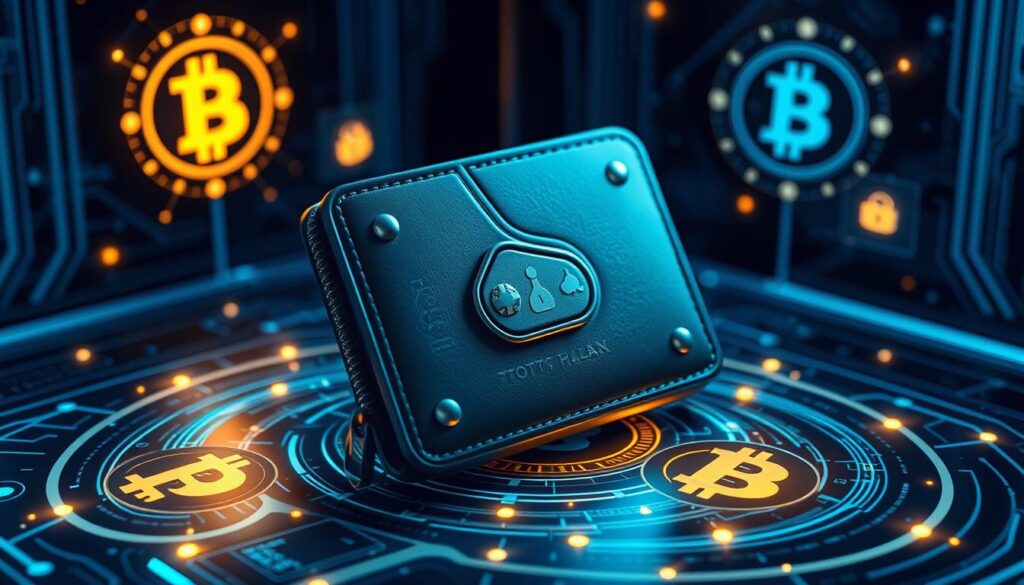
“Custodially held crypto assets could be subject to bankruptcy proceedings.” – Coinbase SEC filing, May 2022
Implementing Two-Factor Authentication
Securing your cryptocurrency transactions is key, and two-factor authentication (2FA) is a must-have. 2FA adds an extra layer of security. It asks for a second verification, like a text or app code, along with your password. This makes it much harder for hackers to get into your account, even if they guess your password.
What is Two-Factor Authentication?
Two-factor authentication, or 2FA, is a security method that needs two types of verification to access your account. It usually asks for something you know (like a password) and something you have (like a phone or token). This makes it very hard for hackers to get into your account.
Setting Up Two-Factor Authentication on Your Wallet
- Many cryptocurrency wallets and exchanges offer 2FA as a security feature. To set it up, you’ll need to download an app like Google Authenticator or Authy and link it to your account.
- After linking, your wallet or exchange will give you a unique code. You’ll need to enter this code along with your password every time you log in.
- Some wallets also let you use a hardware security token for 2FA. This is one of the most secure options.
- Remember to keep your backup codes safe. They can help you get back into your account if you lose your device.
By using two-factor authentication on your cryptocurrency accounts and wallets, you’re taking a big step to protect your digital assets. This security measure helps keep your secure crypto transactions and anti-theft crypto measures safe. It gives you peace of mind and helps protect your digital assets from theft.
“Two-factor authentication is one of the most effective ways to protect your cryptocurrency accounts from unauthorized access. It’s a simple yet powerful security measure that can make a significant difference in keeping your digital assets safe.”
Regularly Updating Software and Wallets
In the fast-changing world of cryptocurrency, it’s key to keep your wallet software and apps current. Updates often bring important security fixes that block new threats. By turning on auto-updates, you keep your software safe and secure, protecting your digital assets.
Why Updates Matter for Security
Cryptocurrency software faces constant threats from hackers. Updates are a strong defense, fixing weak spots and boosting your crypto’s safety. Skipping updates can put your digital assets at risk, making them vulnerable to attacks.
How to Enable Automatic Updates
- Check your wallet’s settings and make sure auto-updates are on. This keeps your software current without needing you to do anything.
- If auto-updates aren’t available, set reminders to update manually. This way, you won’t miss out on security patches.
- Also, sign up for notifications from your wallet or crypto news. This keeps you in the loop about the latest security updates.
Updating your crypto software and wallets regularly is a smart move. It greatly lowers the chance of security breaches. This way, you keep your digital assets safe and secure.
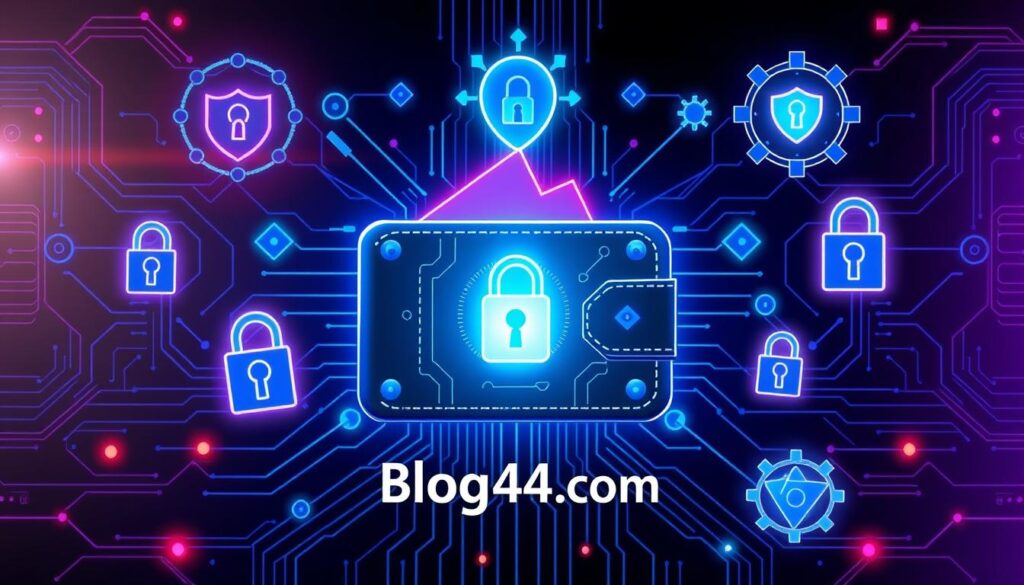
“Regularly updating your cryptocurrency software and wallets is like locking your doors and windows – it’s a simple yet essential step to protect your digital assets.”
Recognizing and Avoiding Phishing Scams
In the world of cryptocurrency, phishing scams are a big concern. Cybercriminals keep finding new ways to trick users. They might pretend to be real exchanges, wallet providers, or influencers. It’s important to know how to spot phishing scams to keep your cryptocurrency safe.
Identifying Phishing Attempts
Phishing scams in crypto often look like real websites or emails. They try to get you to share important info like login details or private keys. Be careful of any messages or links that seem too good to be true.
Tips to Protect Yourself from Phishing
- Check if the source is real by comparing the URL or email with official sites or channels.
- Use two-factor authentication (2FA) on your crypto accounts for extra anti-theft crypto measures.
- Don’t share your private keys, seed phrases, or login details with anyone, even if they seem trustworthy.
- Use a hardware wallet to keep your digital assets safe. It’s less likely to be hacked.
- Keep your crypto in different places, like a cold wallet for long-term and a hot wallet for daily use. This way, a breach won’t ruin everything.
- Keep up with the latest crypto security news and scams. Follow trusted sources and online groups.
By taking these steps, you can lower your risk of falling for phishing scams. Remember, being careful and focusing on cryptocurrency safety is key to safely using crypto.
| Year | Phishing Scam Victims | Funds Lost (Millions) |
|---|---|---|
| 2022 | 300,000+ | $52.1 |
| 2023 | 298,000 | $18.7 |
“Phishing attacks in the crypto world are on the rise, frequently targeting users through seemingly legitimate messages, websites, or applications.”
Using Strong Passwords for Crypto Accounts
Keeping your cryptocurrency accounts safe is very important today. Using strong, unique passwords is a key step. The strength of your passwords is critical for protecting your private keys and ensuring secure transactions.
Characteristics of a Strong Password
A good password should be at least 12 characters long. It should mix uppercase and lowercase letters, numbers, and symbols. Don’t use personal info, common words, or patterns that are easy to guess. Creating a unique, complex password for each account helps prevent unauthorized access.
Password Management Tools to Consider
It can be hard to keep track of many strong passwords. That’s where password management tools are helpful. These tools generate, store, and fill in your passwords for you. This keeps your private keys and transactions safe. LastPass, 1Password, and KeePass are popular choices, known for their strong encryption and easy use.
It’s also important to update your passwords often and use two-factor authentication. These steps add extra security to your accounts. By following these tips, you can protect your digital assets from cyber threats.
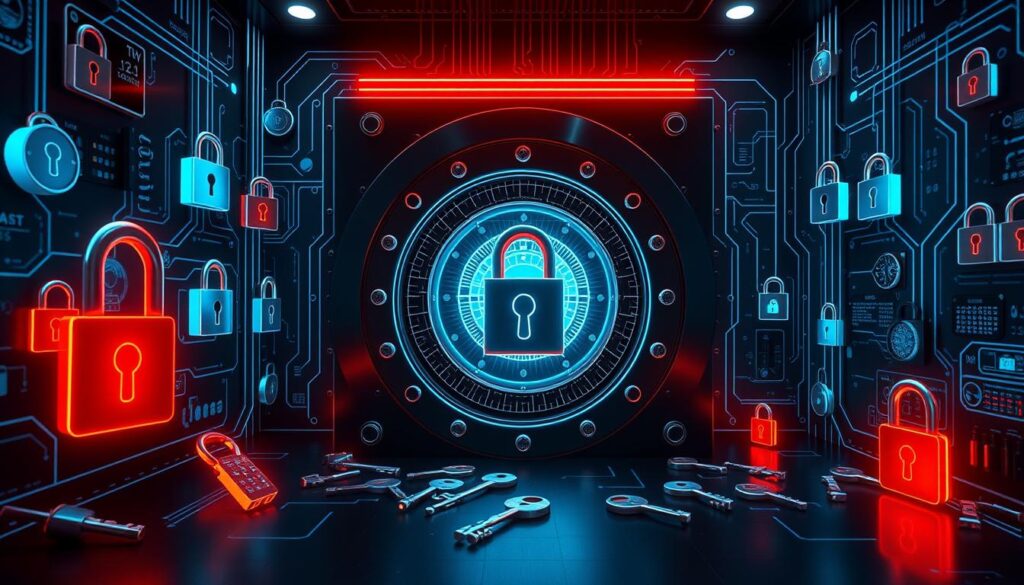
“Cyber threats targeting crypto assets are becoming more frequent and sophisticated. Implementing strong password practices is a critical line of defense.”
Remember, the safety of your crypto depends on your passwords. Spend time making complex, unique passwords. Use password management tools to keep your accounts and transactions secure.
Conducting Transactions on Trusted Platforms
When you’re dealing with secure digital asset transfers, it’s key to use only trusted platforms. These platforms help keep your funds safe and ensure your decentralized ledger stays intact.
Researching Exchanges and Platforms
Before picking an exchange or platform, do your homework. Check their security, user feedback, and if they follow the law. Look for strong security, like cold storage and regular audits. Also, consider their customer support, fees, and how easy it is to use.
Red Flags to Watch Out For
- Be cautious of offers that seem too good to be true. They might be scams or risky investments.
- Stay away from exchanges that have been hacked before. These hacks can put your digital assets at risk.
- Don’t use platforms that are unclear about how they work, who owns them, or if they follow the law.
By doing your research and watching out for red flags, you can make your cryptocurrency transactions safer. This helps protect your decentralized ledger too.
“Utilizing multiple wallets can help lower the effects of a security breach and minimize the loss of funds.”
Remember, keeping your digital assets safe is very important. Take the time to find reliable platforms. Be careful when you’re making transactions to ensure your funds are transferred securely.
Staying Informed About Security Trends
In the world of cryptocurrencies, keeping up with security trends is key. The crypto scene is always changing, with new threats popping up. By following crypto news and joining online security groups, you can keep your blockchain security and cryptocurrency safety up to date.
Following Crypto Security News
It’s important to know the latest about crypto security. Look for trusted news sites and blogs that cover security issues. This way, you can update your security steps to face new dangers.
Joining Security-Focused Communities
Being part of online groups focused on security is helpful. These communities share tips, talk about new threats, and offer support. Being active in these groups helps you stay safe and informed.
| News Source | Focus |
|---|---|
| CoinTelegraph | Comprehensive crypto news and analysis |
| Decrypt | Blockchain and cryptocurrency security updates |
| Coindesk | In-depth reporting on the crypto industry |
By keeping up with security trends, you can protect your crypto better. Embrace the changing crypto world and always prioritize security in managing your digital assets.
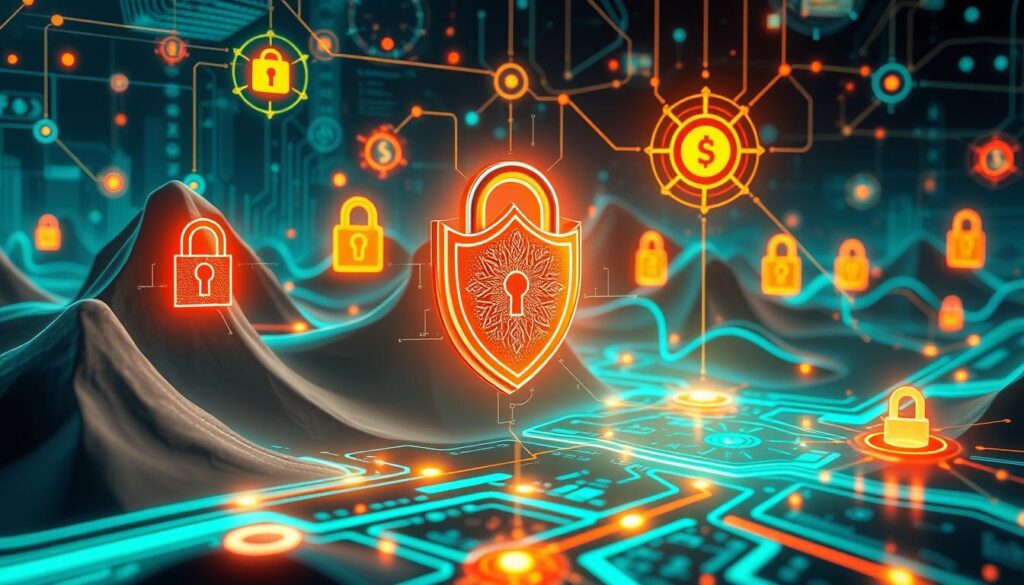
Encrypting Sensitive Information
Keeping your cryptocurrency info safe is key to protecting your digital wealth. Cryptographic transaction encryption is a top way to do this. It locks up your private keys, wallet backups, and any crypto-related documents. This makes it hard for hackers to get to your data.
Benefits of Encryption in Crypto Security
Encryption turns your data into a secret code. This means only those with the right key can read it. So, even if someone gets their hands on your files, they can’t get to your secure crypto transactions info. It’s a strong shield for your crypto, giving you peace of mind.
Tools for Encrypting Your Data
- VeraCrypt: A free, open-source, and cross-platform disk encryption software that supports both file and full-disk encryption.
- BitLocker: A built-in encryption feature in Windows 10 and Windows 11, providing a user-friendly way to encrypt your device’s storage.
- GNU Privacy Guard (GnuPG or GPG): A free and open-source alternative to PGP, suitable for encrypting emails, files, and other sensitive data.
- Keybase: A platform that offers encrypted messaging, file storage, and collaboration tools, with a focus on privacy and security.
Using these tools, you can keep your cryptographic transaction encryption safe. This ensures your crypto transactions stay secure from threats.
“Encryption is the foundation of secure cryptocurrency transactions, protecting your digital assets from prying eyes and unauthorized access.”
Utilizing Virtual Private Networks (VPNs)
Using a Virtual Private Network (VPN) can greatly improve your security when dealing with cryptocurrency. A VPN encrypts your internet connection. This makes it hard for hackers to get your sensitive data during transactions. It also hides your IP address, adding privacy to protect your identity.
How a VPN Enhances Security
VPNs are key in making your secure crypto transactions and anti-theft crypto measures safer. They encrypt your internet traffic. This stops others from seeing your personal info, like your wallet details and transaction data. Your financial info stays safe, even on public Wi-Fi or when using crypto platforms.
Choosing a Reliable VPN Provider
Choosing a good VPN for your crypto activities is important. Look for one that doesn’t log your online activities. Make sure it uses strong encryption, like AES-256. Also, pick a VPN that accepts cryptocurrency payments to keep your transactions private.
| VPN Feature | Importance for Crypto Security |
|---|---|
| Strict No-Logs Policy | Ensures your online activities and transaction data are not stored or shared, protecting your privacy. |
| Strong Encryption Protocols | AES-256 encryption secures your internet connection, preventing unauthorized access to your crypto activities. |
| Cryptocurrency Payment Options | Allows you to pay for the VPN service anonymously, further enhances the privacy of your crypto transactions. |
Using a reliable VPN is a big step towards securing your cryptocurrency. It helps protect your digital assets from anti-theft crypto measures. A good VPN is a strong tool for keeping your crypto activities safe and private.
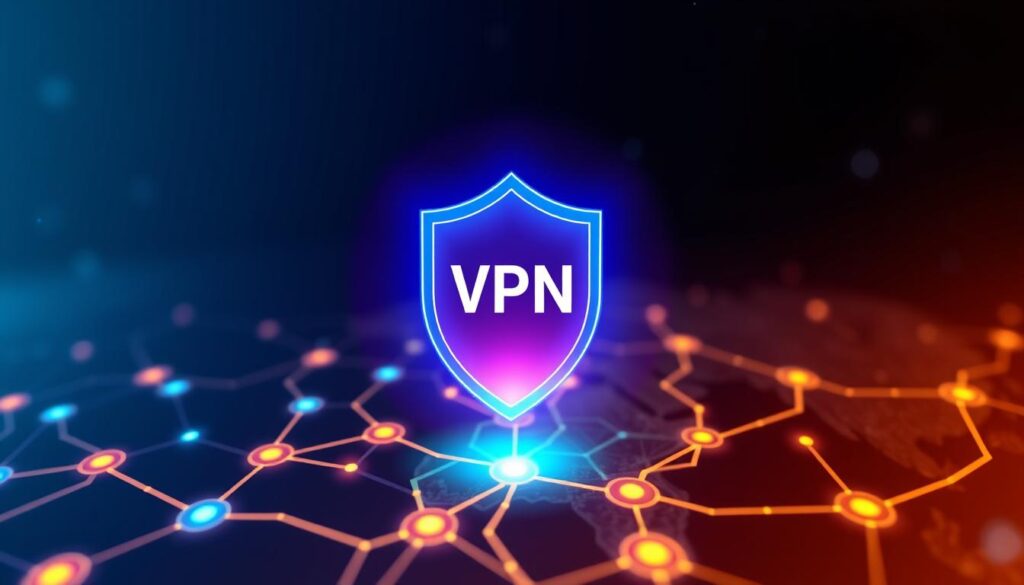
Understanding the Role of Blockchain in Security
Blockchain technology is key to keeping cryptocurrencies safe. It uses a shared, digital ledger to track all transactions. This makes it hard to change or mess with the data. Knowing how blockchain works shows its strong security, like cryptographic hashing and consensus mechanisms.
How Blockchain Technology Works
Blockchain is a digital ledger that records transactions on many computers. Each block in the chain has several transactions. When a new transaction happens, it’s added to every computer’s ledger.
This decentralized system means there’s no single weak point. It’s hard to hack or change the data.
The Security Features of Blockchain
Blockchain has several important security features. These make it a great choice for cryptocurrency transactions:
- Cryptographic Hashing: Blocks are secured with complex algorithms. This makes it hard to alter the data.
- Consensus Mechanisms: Networks use protocols like Proof of Work (PoW) and Proof of Stake (PoS). They check and confirm transactions, keeping the ledger legit.
- Decentralization: Without a central authority, blockchain networks are more resistant to attacks. This reduces fraud and manipulation risks.
- Transparency: All transactions are public. This allows for transparent and auditable record-keeping.
These strong security features, along with blockchain’s transparency and decentralization, make it a solid base for cryptocurrency transactions.
Practicing Good Digital Hygiene
Keeping your cryptocurrency safe needs constant care. Regular checks of your crypto accounts and devices are key. Use a good antivirus to fight off malware and phishing.
Importance of Regular Security Audits
Regular security checks keep you safe from threats. Check your crypto wallet and exchange account details. Make sure your passwords are strong and use 2FA when you can.
Tips for Safe Internet Browsing
Be careful when using public Wi-Fi to protect your digital assets. Don’t download strange files or click on suspicious links. Keep up with the latest security tips from trusted sources.
FAQ
What are the common threats to cryptocurrency security?
Threats to cryptocurrency security include phishing scams, malware attacks, and exchange hacks. Blockchain technology offers some security. But, users must protect their digital assets.
What types of wallets are available for storing cryptocurrency?
There are two main types of wallets: hot and cold wallets. Hot wallets are online and easy to use but riskier. Cold wallets, like Ledger Nano S, are offline for better security.
How can two-factor authentication (2FA) improve the security of my cryptocurrency accounts?
Two-factor authentication (2FA) adds security to your accounts. It requires a second verification, like a text or app code, in addition to your password. This makes it harder for hackers to access your accounts, even if they have your password.
Why is it important to keep my wallet software and cryptocurrency-related applications up-to-date?
Keeping your software and apps updated is key for security. Updates fix vulnerabilities and protect against threats. Enable automatic updates to always use the latest, safest version.
How can I protect myself from phishing scams in the cryptocurrency space?
To avoid phishing scams, always check if sources are real before acting. Be careful of emails or messages asking for sensitive info. Fake websites or emails from exchanges or wallets are common.
What are the characteristics of a strong password for cryptocurrency accounts?
Strong, unique passwords are vital for account security. Use letters, numbers, and symbols. Avoid easy-to-guess info. Consider a password manager for complex, secure passwords.
How can I ensure I’m conducting cryptocurrency transactions on trusted platforms?
Use only trusted platforms for transactions. Research their security, user reviews, and compliance. Be wary of unrealistic offers or platforms with security issues. Look for those with cold storage and regular audits.
How can I stay informed about the latest cryptocurrency security trends and best practices?
Follow reputable crypto news and join security-focused communities. This helps you stay updated on new threats and how to protect against them.
How can encrypting sensitive information related to my cryptocurrency holdings add an extra layer of protection?
Encrypting sensitive info adds protection. Use tools to secure private keys, backups, and documents. This way, even if someone gets your files, they can’t access the data without the decryption key.
How can using a Virtual Private Network (VPN) enhance the security of my cryptocurrency transactions?
A VPN encrypts your internet and hides your IP address. This makes it hard for hackers to intercept your data. Choose a reputable VPN with strong encryption and a no-logs policy.
How does blockchain technology contribute to the security of cryptocurrency networks?
Blockchain is the core of cryptocurrency security. It uses a decentralized ledger to record transactions, making it hard to alter data. Its security features, like hashing and consensus, ensure the integrity of networks.
What are the key aspects of good digital hygiene for maintaining the security of my cryptocurrency holdings?
Good digital hygiene is key for security. Regularly audit your accounts and devices. Use antivirus software and be cautious online, avoiding public Wi-Fi and suspicious links.


















